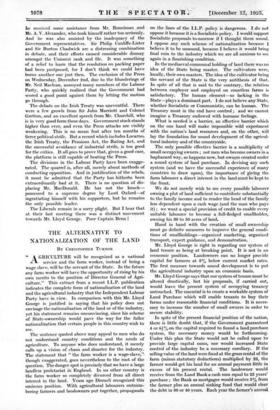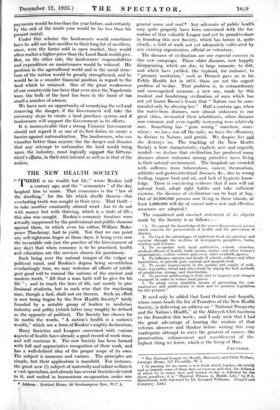THE ALTERNATIVE TO NATIONALIZATION OF THE LAND
BY CHRISTOPHER TURNOR
" AGRICULTURE will be recognized as a national service and the farm worker, instead of being a wage slave, will be the servant of the State. In the future any farm worker will have the opportunity of rising by his own merits to the position of Director General of Agri- culture." This extract from a recent I.L.P. publication indicates the complete form of nationalization of the land and the agricultural industry that the Independent Labour Party have in view. In comparison with this Mr. Lloyd George is justified in saying that his policy does not envisage the nationalization of the land or of the industry, yet his statement remains -unconvincing, since his scheme of State-ownership would pave the way for the fuller nationalization that certain people in this country wish to see.
The sentence quoted above may appeal to men who do. not understand country conditions and the needs of agriculture. To anyone who does understand, it merely calls up a vision of chaos and disaster for the industry. The statement that " the farm worker is a wage-slave,". though exaggerated, goes nevertheless to the root of the question. The danger spot is precisely that we have a large landless proletariat in England. In no other country is the farm worker so completely diYorced from all direct interest in the land. Years ago Disraeli recognized. this ominous position. With agricultural labourers outnum- bering farmers and landowners put together, propaganda on the lines of the I.L.P. policy is dangerous. I do not oppose it because it is a Socialistic policy. I would support Socialistic proposals to-morrow if I thought them sound. I oppose any such scheme of nationalization because I believe it to be unsound, because I believe it would bring final ruin to the industry which we are all anxious to see again in a flourishing condition.
In the mediaeval communal holding of land there was no idea of the State being master. The cultivators were, locally, their own masters. The idea of the cultivator being the servant of the State is the very antithesis of that. In spite of all that is said -to the contrary, the relation between employer and employed on countless farms is satisfactory. The human element—so lacking in -the State--plays a dominant part. I do not believe any State, whether Socialistic or Communistic, can be human: The Treasury must in the end have control ; and we cannot imagine a Treasury endowed with -humane feelings.
What is needed is a barrier, an effective barrier which on the one hand will make impossible wild experiment with the nation's land resources and, on the other, will lay the foundation for sound development of the agricul- tural industry and of the countryside.
The only possible effective barrier is a multiplicity of small occupying owners ; not men who become owners in a haphazard way, as happens-now, but owners created under a sound system of land purchase. In devising any such system (and we have the successful experience of many countries to draw upon), the importance of giving the farm labourer a direct interest in the land must be kept to the front.
We do not merely wish to see every possible labourer owning a plot of land sufficient to contribute substantially to the family income and to render the head of the family less dependent upon a cash wage (and the man who pays it) ; we want a special provision of credit to enable every suitable labourer to become a full-fledged smallholder, owning his 30 to 50 acres of land.
Hand in hand with the creation of small ownership must go definite measures to improve the general condi- tions of smallholdings—organized marketing, organized transport, expert guidance, and demonstration. .
Mr. Lloyd George is right in regarding our system of land tenure as being at breaking point. It is not in an economic position. Landowners can no longer provide capital for farmers at 8% below current market rates. The first measure towards sound development is to put the agricultural industry upon an economic basis.
Mr. Lloyd George says that our system of tenure must be altered drastically, but his proposals, if carried out, would leave the present system of occupying tenancy untouched. The essential is to create a workable system of Land Purchase which will enable tenants to buy their farms under reasonable financial conditions. It is neces- sary to increase the number of small owners in order to secure stability.
In spite of the present financial position of the nation, there is little doubt that, if the Government guaranteed 4 or 41% on the capital required to found a land purchase system, the necessary money- would be forthcoming. Under this plan the State would not be called upon to provide. large capital sums, nor would increased State control of the industry be ,a necessary corollary. If the selling value of the land were fixed at the gross rental of the.
farm (minus statutory deductions) multiplied by 25, the farmer would, get his land for an annual payment little in excess of his present rental. The landowner would receive from the Land Bank a cash sum equal to 25 years' purchase ; the Bank as mortgagee would receive 5% from the farmer, plus an annual sinking fund that would clear the debt in 36 or 40 years. Each year the farmer's annual, payments would be less than the year before, and certainly by the end of the tenth year would be far less than his present rental. Under thii scheme the landowners would sometimes have to add' one last sacrifice to their long list of sacrifices, since, were the farina' sold in open market, they would often realize a higher price than the Land Bank would give. But, on the other side, the landowners' responsibilities and expenditure on maintenance would be reduced. His position in the agricultural world and in the social struc- ture of the nation would be greatly strengthened, and he would: be in a sounder financial position in regard to the land which he retained. One Of the great weaknesses of our countryside has been that ever since the'Napoleonie wars the bulk Of the land has been in the hind of too small a number of owners.
We have-nOw an opportunity of remedying the evil and removing the • danger, if, the GovernMent will take the necessary steps to create a land purchase system and if landoivfiers will support the Government in its efforts.
It is inconceivable that 'a strong Unionist Government should not regard it as one of its first duties to create a barrier,against nationalization. The landowners, who can visualize better than anyOne else the danger and disaster that any attempt to nationalize the land would bring upon the. industry, must logically _support- the -00i ern--- nient's ciforts, in their off interest as well as in that of the nation.























































 Previous page
Previous page